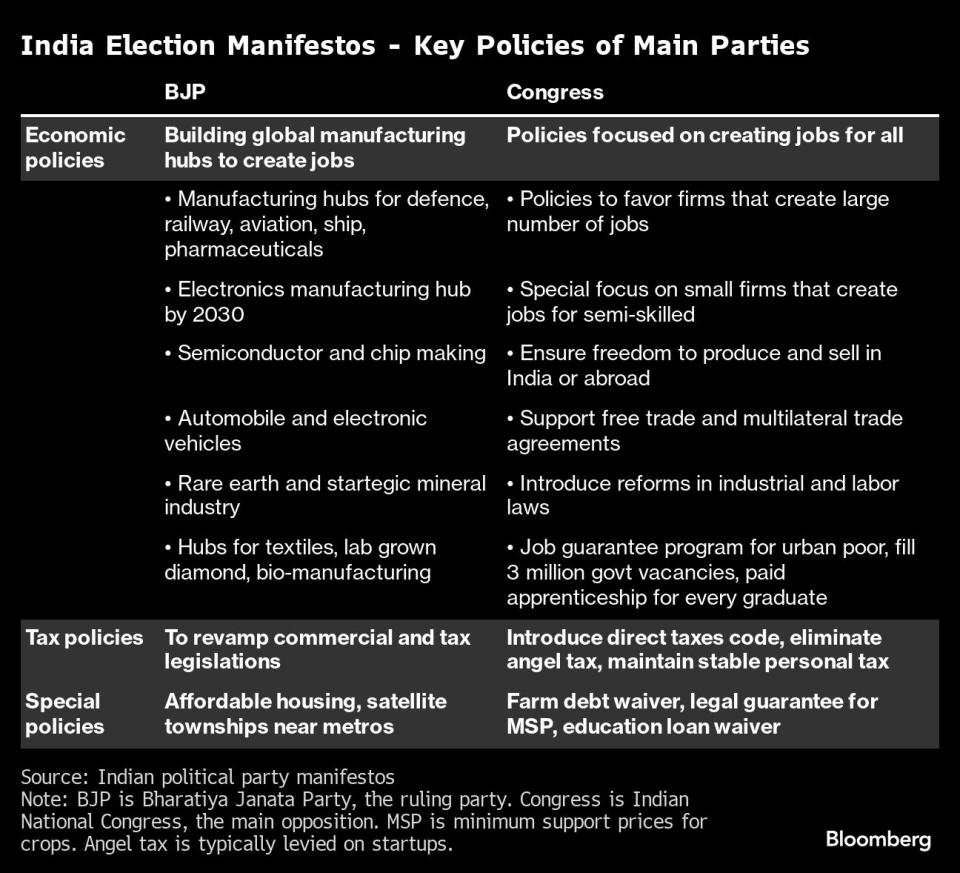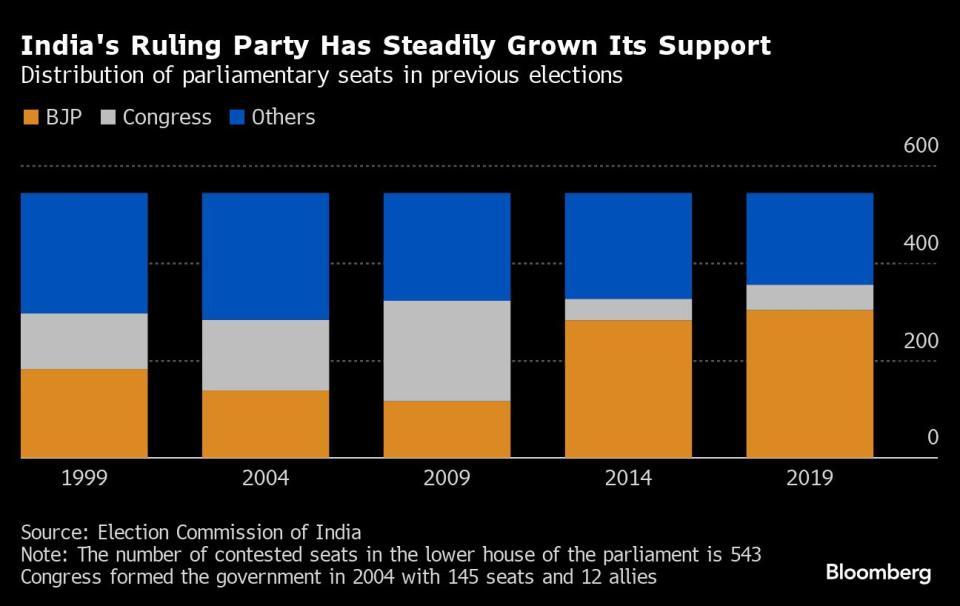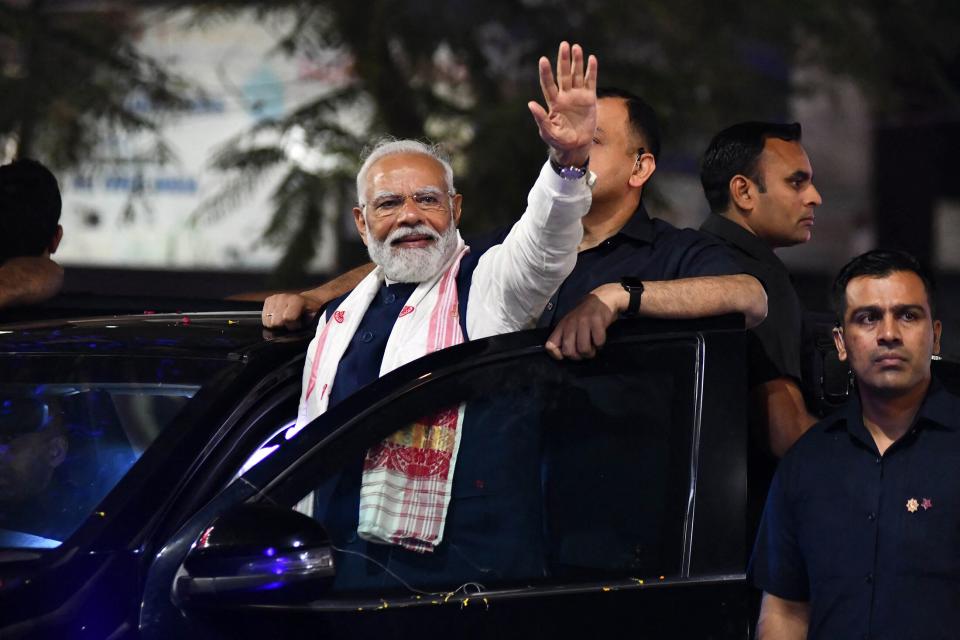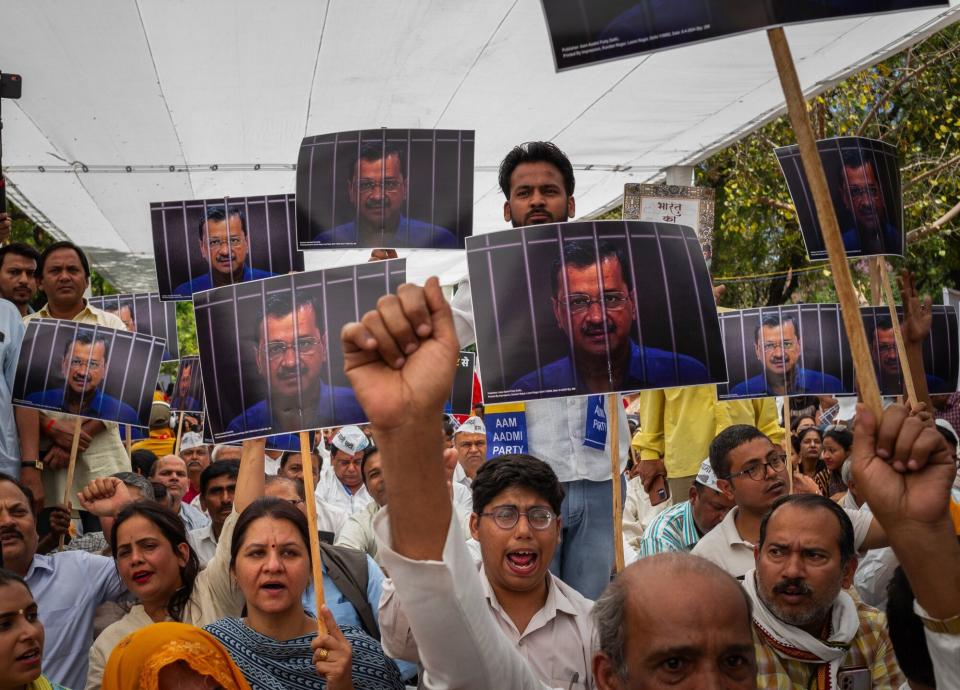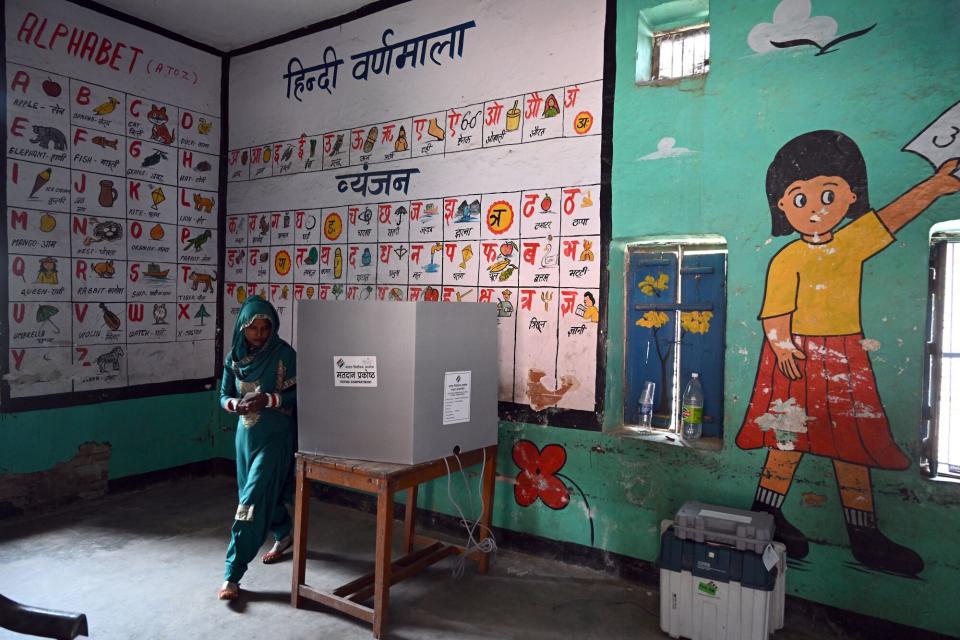Modi Bids for 3rd Term in World’s Biggest Election
(Bloomberg) -- As India heads into an election, follow Bloomberg India's channel on WhatsApp for how money and business intersect with politics and power. Sign up here.
Most Read from Bloomberg
Magnificent Seven Earnings Arrive With Stocks at Critical Moment
New York’s Rich Get Creative to Flee State Taxes. Auditors Are On to Them
Almost 1 billion Indians began voting Friday in elections lasting more than six weeks, weighing up whether to hand Prime Minister Narendra Modi a third five-year term to continue his mix of economic and Hindu nationalist policies.
Voting in the world’s biggest election takes place in seven phases until June 1 to accommodate the complicated logistics involved in getting ballots to everyone in the sub-continent. The southern state of Tamil Nadu and 20 other regions went to the polls on Friday in the first phase.
Modi’s Bharatiya Janata Party, or BJP, is campaigning on the prime minister’s popularity, the strength of India’s economy and a pro-Hindu agenda that has resonated with the country’s majority. The opposition, a coalition of parties led by the Indian National Congress, is arguing that Modi has eroded India’s democratic institutions and paid insufficient attention to the jobless and the poor.
The national election results won’t be known until June 4, when vote counting takes place.
About 62% of registered voters cast their ballots as of 5 p.m. local time on Friday, according to the Election Commission of India, with the eastern state of West Bengal recording the highest turnout of 77.57%.
Lines had begun forming early Friday morning at more than 185,000 polling booths spread out across the 102 constituencies that voted. TV channels and social media showed a mix of politicians and some movie stars exiting polling stations holding up their index fingers with ink marks to show evidence of voting.
Indian financial markets were mostly subdued as voting got underway, with the conflict in the Middle East driving trading. The Indian rupee fell to a record low for the second time this week before reversing losses, while stocks closed the day up 0.8%.
Modi enjoys high popularity ratings in India, and the BJP is aiming for a substantial win that expands its majority in the country’s lower house of parliament, the Lok Sabha. The ruling party is targeting a two-thirds majority — or 370 out of the 543 seats up for grabs — and 400 seats with allied parties. In 2019, the BJP won 303 seats.
The BJP and the opposition present “starkly different visions for India’s future,” according to an analysis on Friday by Bloomberg Economics. While a BJP win would likely mean a continued focus on infrastructure, the economy and India’s world stature, an opposition win could lead to attention on democratic frameworks and education reforms, the analysis found.
The election comes at a time of India’s growing importance globally. The US has been courting India as it seeks a counterweight to Beijing, and global companies from Apple Inc. to Tesla Inc. have been looking to boost their presence in the country as part of a broader push by many firms to diversify away from China.
Modi has benefitted from the country’s rising stature as well as India’s robust growth, the fastest among any major world economy at more than 7%. BJP-backed social programs like the distribution of free food to the poor and subsidized cooking gas have been a source of popularity for the prime minister.
A major draw for Modi has been his Hindu nationalism agenda to elevate the place of the religion in public life, a policy that opposition parties and activists say is divisive and goes against the country’s secular roots. A central achievement for Modi was the opening in January of a Hindu temple in the northern city of Ayodhya on the site of a mosque destroyed by Hindu zealots.
Hindus make up 80% of India’s population, while Muslims account for about 14%.
India’s opposition parties have also focused on economic priorities in their pitch to voters, with the Congress party promising guaranteed prices on crops to farmers, 3 million jobs in the federal government and cash handouts to women.
The opposition has looked to exploit concerns about the economy. Despite its brisk growth, the economy isn’t producing jobs fast enough to employ its huge population of young people. High inflation remains a problem, as well as a widening gulf between rich and poor.
The opposition has faced setbacks, though, including defections to the ruling party and investigations and jailings of key leaders, which they say are politically motivated. The BJP has denied the claims.
Aside from the national vote, two north-eastern states are also voting for their state legislatures Friday — Sikkim and Arunachal Pradesh. The results of the state election will be released on June 2.
(Updates with voter turnout, market reaction and analysis starting in 5th paragraph)
Most Read from Bloomberg Businessweek
What Really Happens When You Trade In an iPhone at the Apple Store
Rents Are the Fed’s ‘Biggest Stumbling Block’ in Taming US Inflation
Aging Copper Mines Are Turning Into Money Pits Despite Demand
©2024 Bloomberg L.P.

 Yahoo News
Yahoo News 
